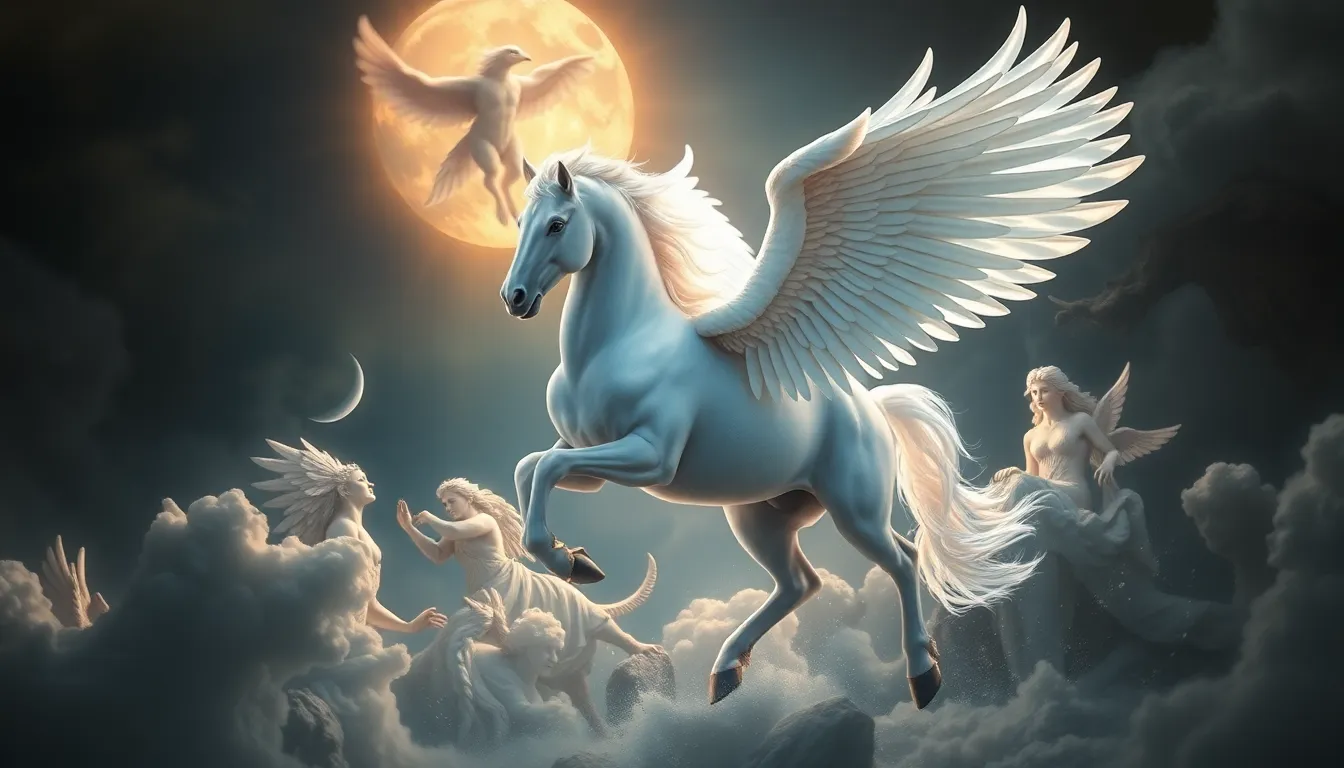The Connection Between Pegasus and the Divine in Greek Mythology
I. Introduction
In the rich tapestry of Greek mythology, few creatures hold as much allure and symbolism as Pegasus, the winged horse. Born from the blood of Medusa, Pegasus transcends mere physical form to embody a profound connection to the divine, art, and heroism. This article delves into Pegasus’s relationship with the divine, exploring its origins, symbolism, and enduring legacy within mythology and culture.
II. The Birth of Pegasus
Pegasus’s origin story is as fascinating as the creature itself. According to myth, Pegasus sprang forth from the blood of Medusa, a Gorgon whose gaze turned men to stone. When the hero Perseus beheaded Medusa, her blood mixed with the earth and gave birth to Pegasus. This dramatic birth is steeped in symbolism, representing the emergence of beauty and inspiration from chaos and darkness.
In this narrative, the gods play a pivotal role. After his birth, Pegasus was taken under the care of the divine. His emergence from the chaotic circumstances surrounding Medusa’s death emphasizes the theme of divine intervention in the world. Pegasus symbolizes purity, creativity, and the transformative power of the divine, illustrating how beauty can arise from turmoil.
III. Pegasus as a Symbol of Inspiration
Throughout history, Pegasus has been revered as a symbol of inspiration, particularly in the realms of art and literature. Many poets and artists have drawn upon the image of Pegasus as a muse, igniting the creative spark within them. The association with creativity is further cemented by Pegasus’s connection to the Muses, the divine goddesses of the arts and sciences.
- In art, Pegasus often appears in various forms, from sculptures to paintings, representing the transformative power of creativity.
- In literature, Pegasus embodies the concept of divine inspiration, encouraging artists to transcend the mundane and explore the realms of imagination.
The idea of Pegasus as a muse underscores the belief that divine forces can inspire human creativity, linking the mortal world to the celestial in the pursuit of artistic expression.
IV. Pegasus and the Gods: Key Interactions
Pegasus’s interactions with the gods further cement his status as a divine being. One of the most notable relationships is with Zeus, the king of the gods. After his birth, Pegasus served Zeus, bringing thunder and lightning to the heavens. This service illustrates Pegasus’s role as a connector between the divine and mortal realms.
Additionally, Pegasus played a crucial role in the Trojan War. The famed warrior Bellerophon, who rode Pegasus, is often depicted battling the Chimera, a monstrous creature terrorizing Lycia. This heroic partnership emphasizes Pegasus’s role in aiding gods and heroes alike, showcasing his importance in divine quests.
V. The Myth of Bellerophon and Pegasus
The myth of Bellerophon is intrinsically linked to Pegasus and represents a journey of heroism and divine favor. Bellerophon, a mortal hero, was bestowed with Pegasus by the gods. This gift allowed him to soar above the ground, engaging in battles and quests that would ultimately define his legacy.
As Bellerophon rode Pegasus, he encountered various challenges, including slaying monstrous creatures. The bond between them exemplifies the theme of divine assistance, as Pegasus acts as a vehicle for Bellerophon’s heroism, facilitating his ascension from a mere mortal to a legendary figure.
VI. Pegasus in the Celestial Realm
In a remarkable turn of events, Pegasus was transformed into a constellation by Zeus after his mortal adventures. This transformation signifies the eternal nature of Pegasus and his connection to the divine. The constellation of Pegasus is easily recognizable in the night sky and serves as a reminder of the heroism, beauty, and inspiration associated with this mythical creature.
The significance of constellations in Greek mythology cannot be understated. They were seen as manifestations of divine stories, often embodying the traits of the figures they represented. Pegasus, in the heavens, symbolizes divine ascension and immortality, reminding mortals of the potential for greatness and the enduring influence of the divine.
VII. The Cultural Legacy of Pegasus
Pegasus’s legacy extends far beyond ancient Greece, leaving an indelible mark on later art and literature. From the Renaissance to modern times, Pegasus has been a symbol of inspiration, creativity, and the quest for knowledge. Artists and writers have repeatedly drawn upon this figure to evoke themes of transcendence and divine connection.
- In contemporary culture, Pegasus appears in various forms, including literature, film, and art, often symbolizing freedom and the pursuit of dreams.
- Modern interpretations of Pegasus reflect his enduring nature, emphasizing themes of creativity, heroism, and the divine spark within all individuals.
The lasting impact of Pegasus on Western culture underscores the universal themes present in mythology, resonating with audiences across generations and cultures.
VIII. Conclusion
In conclusion, the connection between Pegasus and the divine in Greek mythology is a captivating narrative that weaves together themes of inspiration, heroism, and transformation. From his birth from chaos to his role as a constellation, Pegasus embodies the essence of divine influence in human creativity and the pursuit of greatness.
As we reflect on the significance of Pegasus, we recognize that these mythological connections continue to resonate in contemporary society. They serve as a reminder of the power of inspiration and the enduring influence of the divine in our lives, encouraging us to reach for the skies and embrace our own heroic journeys.




